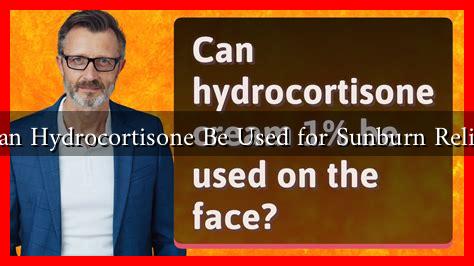-
Table of Contents
Can Hydrocortisone Be Used for Sunburn Relief?
Sunburn is a common skin condition that occurs when the skin is overexposed to ultraviolet (UV) radiation from the sun. It can lead to redness, swelling, pain, and in severe cases, blistering. Many people seek relief from the discomfort of sunburn, and one potential treatment option is hydrocortisone. This article explores the effectiveness of hydrocortisone for sunburn relief, its mechanism of action, and alternative treatments.
Understanding Hydrocortisone
Hydrocortisone is a corticosteroid medication that is commonly used to reduce inflammation and alleviate symptoms associated with various skin conditions. It is available in various forms, including creams, ointments, and oral tablets. When applied topically, hydrocortisone works by:
- Reducing inflammation in the affected area.
- Decreasing redness and swelling.
- Alleviating itching and discomfort.
Due to these properties, hydrocortisone is often recommended for conditions such as eczema, psoriasis, and allergic reactions. But how effective is it for treating sunburn?
Hydrocortisone for Sunburn Relief
While hydrocortisone can provide relief for inflammatory skin conditions, its use for sunburn is somewhat controversial. Here are some key points to consider:
- Inflammation Reduction: Hydrocortisone can help reduce the inflammation associated with sunburn, potentially alleviating pain and discomfort.
- Timing of Application: For best results, hydrocortisone should be applied soon after sun exposure. Delaying treatment may reduce its effectiveness.
- Severity of Sunburn: Mild sunburns may respond well to hydrocortisone, while more severe cases may require additional treatments.
However, it is essential to note that hydrocortisone is not a cure for sunburn. It does not address the underlying damage caused by UV radiation, nor does it promote healing of the skin. In fact, some dermatologists advise against using hydrocortisone for sunburn, especially in cases of severe burns, as it may hinder the natural healing process.
Alternative Treatments for Sunburn
For those seeking relief from sunburn, several alternative treatments can be effective:
- Cool Compresses: Applying a cool, damp cloth to the affected area can help soothe the skin and reduce inflammation.
- Aloe Vera: Known for its healing properties, aloe vera gel can provide moisture and relief from pain.
- Over-the-Counter Pain Relievers: Nonsteroidal anti-inflammatory drugs (NSAIDs) like ibuprofen can help reduce pain and inflammation.
- Hydration: Drinking plenty of water is crucial for helping the body recover from sunburn.
Case Studies and Statistics
According to the American Academy of Dermatology, approximately 1 in 3 adults in the United States experience sunburn each year. A study published in the Journal of the American Academy of Dermatology found that while topical corticosteroids like hydrocortisone can reduce inflammation, they may not significantly improve healing time for sunburned skin. Instead, the study emphasized the importance of preventive measures, such as using sunscreen and wearing protective clothing.
Conclusion
In summary, while hydrocortisone may provide temporary relief from the inflammation and discomfort associated with mild sunburn, it is not a definitive treatment. Its effectiveness can vary based on the severity of the burn and the timing of application. For optimal sunburn relief, consider alternative treatments such as cool compresses, aloe vera, and over-the-counter pain relievers. Ultimately, prevention remains the best strategy for avoiding sunburn, underscoring the importance of sun safety practices.
For more information on sunburn prevention and treatment, visit the American Academy of Dermatology.


